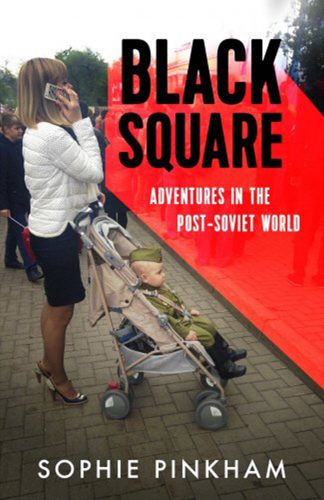Nash Holos: “Black Square: Adventures in Post-Soviet Ukraine”
 Welcome to Ukrainian Jewish Heritage on Nash Holos Ukrainian Roots Radio. I’m Peter Bejger.
Welcome to Ukrainian Jewish Heritage on Nash Holos Ukrainian Roots Radio. I’m Peter Bejger.
A young woman working in an office in New York City writes: “I was just another girl in a cubicle, doing the usual two years before leaving for graduate school. I was a mass produced good. My row of cubicles was almost entirely female, dark-haired and petite. We all wore colorful pashmina shawls to protect us against the air-conditioning, and we got our periods at the same time.”
Her life changes radically when she meets a charismatic Ukrainian doctor at a conference. He is an activist who helps Eastern European drug users get HIV treatment. And soon our restless young woman, named Sophie Pinkham, starts working in programs to reduce drug-related harm through needle-exchange, drug treatment, and other services.
Pinkham plunges into the chaotic harm reduction world of sex workers, junkies, and other lost souls in contemporary Ukraine. This is a world not often seen by foreigners. She meets a fascinating cast of characters. And her adventures in what she calls “post-Soviet punk delirium” are told in a riveting book called Black Square: Adventures in Post-Soviet Ukraine.
Pinkham deepens her encounter with Ukraine by collecting oral histories about women’s rights and AIDS activism, as well as making a documentary about women and drugs. Her various projects provide an opportunity to travel off the beaten path.
One such trip is to south-central Ukraine. She is accompanied by two friends, sisters who had left Moscow as children in the wave of Jewish emigration in the late Soviet era. The now thoroughly Americanized sisters wanted to find their grandmother’s village.
The three women, with no husbands and no children, are sometimes a source of curiosity for puzzled, tradition-minded locals. The intrepid gals stumble their way to a town once called Stalindorf, a town once full of Jews before the Second World War. There they found an old and bedridden man who was happy to reminisce.
The Last Jew in Stalindorf came from a family of farmers who had been sent to the region by the tsar, along with hundreds of other Jews. He told Pinkham that once upon a time the Jews and the Ukrainians and the Russians there had gotten along, more or less. Then Stalin starved them. They had to eat prairie dogs.
Later the Germans invaded and at age fifteen the Last Jew in Stalindorf had driven the family’s cows all the way to Kazakhstan, eating more prairie dogs. His sister and father were killed in the war. He and his mother returned alone to their village. They continued to eat prairie dogs. For even in peacetime, even when the crops had grown back, they had grown fond of the taste.
This was an expedition into Ukraine’s past. Pinkham encounters Ukraine’s present in her friendship with musician Mitya. Mitya is a Jewish conservatory-trained clarinetist from Russia who formed a klezmer band in Kyiv. Pinkham describes his clarinet playing as “nimble and tender, with an absolutely pure tone, like a ray of sunlight dancing through forest cover.”
Mitya’s klezmer band was initially skeptical of the Revolution of Dignity on the Maidan. They were all from southern or eastern Ukraine and spoke Russian. But then they played a show in Moscow. And they argued with a brainwashed audience steeped in anti-Ukrainian propaganda. After that experience, the band started wearing Ukrainian ribbons.
Mitya went on to sing the early 20th century Yiddish revolutionary song “Down with the Police” on the main stage of the Maidan. In a twist, the song was performed in a Ukrainian-language version prepared by Mitya’s Yiddish teacher Tanya. In a further twist, Tanya is a Ukrainian who mastered Yiddish because she believes the language was important for Ukrainian history.
Pinkham ironically notes these testaments to the intimacy of Jewish and Ukrainian culture while also filling in some poignant back-story. Mitya’s grandmother was from Kyiv. Her entire family was killed at Babyn Yar. She and her sister were able to get out before the Germans came. The grandmother was never able to bring herself to return to Kyiv. But her grandson had grown to love Kyiv.
Pinkham writes about Mitya, “As he imagined it, the music that had evaporated into the atmosphere after the destruction of Ukraine’s Jewish community would condense into sound again.”
Black Square: Adventures in Post-Soviet Ukraine by Sophie Pinkham is published by W.W. Norton and is available in bookstores or through online booksellers.
This has been Ukrainian Jewish Heritage on Nash Holos Ukrainian Roots Radio. From San Francisco, I’m Peter Bejger. Until next time, shalom!
Listen to the program here.
Ukrainian Jewish Heritage is brought to you by the Ukrainian Jewish Encounter (UJE), a privately funded multinational organization whose goal is to promote mutual understanding between Ukrainians and Jews. Transcripts and audio files of this and earlier broadcasts of Ukrainian Jewish Heritage are available at the UJE website and the Nash Holos website.



















